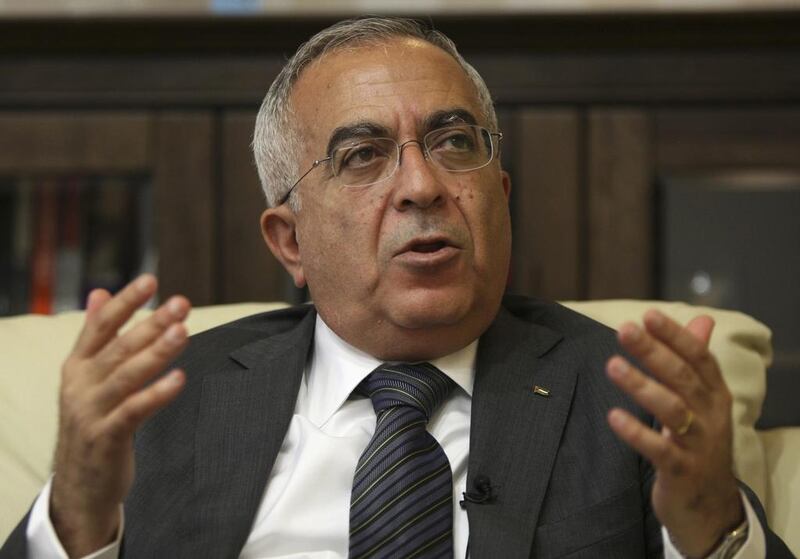The Trump administration shocked everyone at the United Nations, including American diplomats, by suddenly blocking the appointment of a new peace envoy to war-ravaged Libya.
On Thursday, confident he had secured Washington’s private agreement, United Nations secretary general Antonio Guterres announced his selection of former Palestinian prime minister Salam Fayyad.
But on Friday, jaws dropped as Washington's UN ambassador, Nikki Haley, issued her unexpected, and bizarre, public response. Foreign Policy magazine reports that "the White House stepped in at the last minute to kill off the appointment".
Once again, Donald Trump’s left hand seemingly had no clue about what his right was doing.
In yet another mind-boggling inversion of reality – an emerging hallmark of Mr Trump’s maladministration – the White House denounced the selection as “unfairly biased” against Israel because Mr Fayyad is Palestinian.
Shabby gloating by Israel's UN ambassador, Danny Danon, notwithstanding, this wasn't an Israeli idea. The Israeli daily Ha'aretz confirms that the Israeli government wasn't even consulted about the decision.
Barring Mr Fayyad because he is a Palestinian reflects the same depersonalisation, dehumanisation and identity-based marginalisation that permeates the Trump administration’s refugee and travel bans, and plans for massive anti-immigrant witch-hunts.
It is the handiwork of the American alt-right, not the Israeli far-right.
A racist coterie within the Trump administration, led by White House chief strategist Steve Bannon, has been ramming through as much of its fanatical agenda as possible, before more normative power centres that may oppose them can fully form.
This clique of crackpots was primarily responsible for both the venomous excesses and inept blunders of Mr Trump’s disastrous first three weeks.
Mr Bannon’s alt-right gang surreptitiously drafted the notorious travel ban, which has been blocked by a court that cited the “public interest in freedom from discrimination”. Mr Bannon even insisted on trying to prevent permanent US residents from returning to their homes, jobs and families. But that was so blatantly illegal it was immediately withdrawn.
The statement barring Mr Fayyad speaks in this distinctive, immediately identifiable and sadistically racist voice. It does not acknowledge him as a person to be judged on his own merit, instead casting him as a kind of flag with legs.
The statement doesn’t even refer to Mr Fayyad by name, only as “the former Palestinian Authority prime minister”, as if all such persons constitute an interchangeable generic category that tells you all you need to know about how bad they are.
Any former Palestinian prime minister must apparently be ostracised from international public service and, presumably, polite company.
Mr Fayyad is actually an outspoken and pro-American secular liberal who embodies moderation, pragmatism, accountability and good governance.
He worked to build the state institutions of the Palestinian people, improve their living conditions, give them hope, and constructively harness their skills and energy. He created a clean and transparent Palestinian public finance system.
Mr Fayyad opposes violence but participates in non-violent protests. He led settlement product boycotts, but also pursued security coordination with Israel in the interests of both peoples.
He courageously questioned the ill-considered Palestinian UN bids in 2011 and 2012 as only promising symbolic gains with huge real costs. Reckless, unthinking American and Israeli responses targeted his budgets and destroyed his premiership.
The US statement opposing Mr Fayyad issued a Kafkaesque indictment of Palestinians, punishing them for their own statelessness. Mr Fayyad is a Palestinian. Therefore, he is stateless. Allowing him to work for the UN might imply that, like everyone else, Palestinians should have a state or functional citizenship. Israel allows them neither independence nor citizenship. Therefore, Palestinians must be excluded from international institutions to spare Israeli discomfort.
Palestinian statelessness is reinscribed as a crucial signifier, not of suffering, but of guilt. Allowing Mr Fayyad to serve the UN might highlight his statelessness. Therefore, it would be “unfairly biased” against Israel to allow him any notable role. Possibly he might be allowed to empty the rubbish at night, but the same logic might easily identify that as another threat to Israel.
If Mr Fayyad working for peace in Libya is “detrimental” to Israel, then any Palestinian doing anything anywhere can certainly also be objectionable. Why not?
Mr Fayyad’s exclusion might have been intended as retaliation for the recent UN Security Council condemnation of Israeli settlements. But Mr Trump is inching ever closer to the only rational position, now agreeing that “going forward with these settlements” is not “a good thing for peace”. “Every time you take land for settlements, there is less land left,” the property developer explained.
The Jerusalem Post said a senior administration official also confirmed Mr Trump is committed to a two-state solution and opposes unilateral actions that could undermine peace efforts, including settlement announcements.
That sounds like fomer president Barack Obama. It sounds nothing like the Trump administration’s atrocious, alt-right inflected statement opposing Mr Fayyad.
Hussein Ibish is a senior resident scholar at the Arab Gulf States Institute in Washington
On Twitter: @ibishblog





